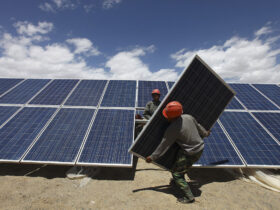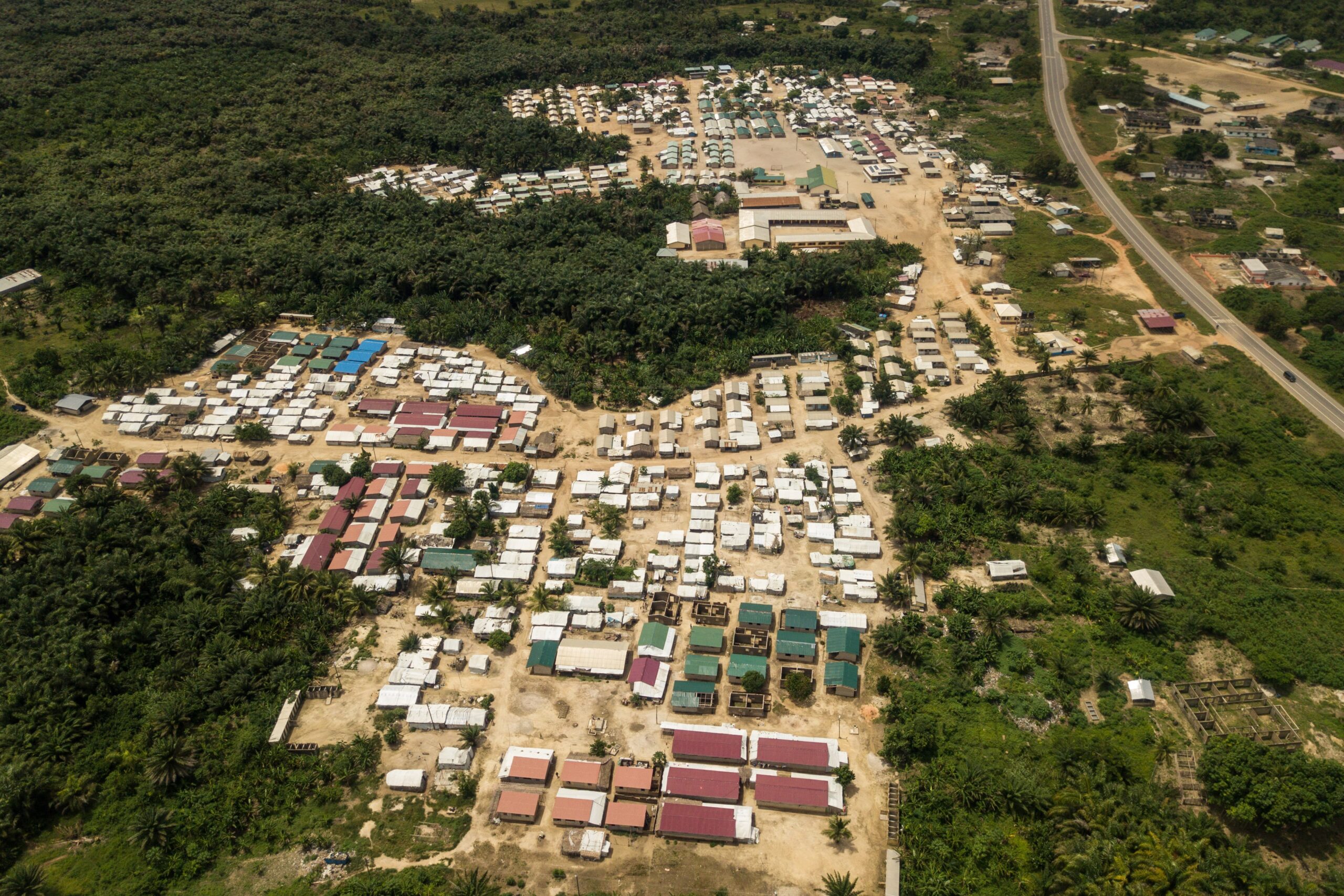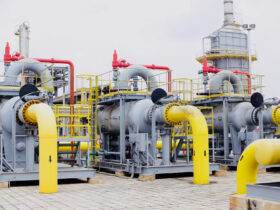
The Association of Oil Marketing Companies (AOMC), established in October 2003, is an industry association and a private initiative by oil marketing operators in Ghana. It is an advocacy institution established to help direct downstream policy, legislation, and regulation and pursue research towards the development of the downstream sector.
Mr. Kwaku Agyeman-Duah is the Chief Executive Officer of AOMC, referred to as the Industry Co-ordinator. The group ensures that its members maintain strict compliance with directives of the National Petroleum Authority (NPA) and stipulations of the NPA Act. He has been CEO of AOMC for 8 years and shares insights on the Association’s beginnings and operations with Energy Ghana Magazine.
The Beginning Of AOMC.
This started when I was in South Africa doing consulting and business, and we came down here. It was a South African consultation thing when we came, we realized Ghanaians are the type that likes dealing with stuff.
And we were doing jobs for the private sector initially and later the government. This was in 2008. Some of the things I realized was that the NPA Act was for everybody and not for the NPA alone, and I have lived in a jurisdiction where when somebody wants to do business, the first thing you will have to do is look at the laws and regulations regarding that particular business.
And what we used to do was that we looked for the laws and realized this group was deficient. So, the first thing I did was to get people to own the law, which I know is something that you should know so that you will know where to go and where to stay, and in everything else, you will have to refer to the NPA Act. NPA says we should do this or that. But they [OMCs] had not tried to understand why the regulators say we should do this.
At the time, Mohammed Amin, current Deputy Energy Minister, and I came together and looked at the industry, we shared a lot of thoughts and ideas. We were looking at shaping the regulation and we also looked at the caliber of people in the industry, where people think if they have money they can just come in.
To strengthen human resources, we went back for training, planned how we desired the association to be, and subsequently started working out how to restructure it. We also had classes for our members, who numbered 30 at the time.
The first thing I did was I went round everywhere to see, trying to find out why they were not attending meetings. I got a lot of information from them. Then we shipped all these thoughts and came out with a new regulation that would be more participatory.
The Association used to be one-sided. However, anybody can now come out to become the chairman of the board. Before it was the preserve of the top three or top four of the founding members, however, we have resolved that. It was all by persuasion.
We also have five committees supporting the board. So we are broadening ourselves, of course, the stakeholder representation is no more antagonistic but it is more about you having your interest and the association has its interest.
From your narrative, you have made enormous efforts to put together the basic structures for the Association to grow. What do you think is lacking and what should be done to put it a step from where you are?
The institution has to grow. We used to be 30 people but now we are almost 104. The variations are enormous and you have to deal with them. The aspirations will not be the same but as an association, we have the objectives that we try to rally people around. The objective is still as it was but it is all about getting people to think like all of us.
It is where we are getting to and that is the most difficult thing. The main issue is getting people to follow standards, they’re not for EPA. The standards are not for GES, but they are is for the operators. That’s where we ought to ensure safety or quality.
The second thing we have to do is to get people to train our personnel. The tender, pro attendance, is huge. We also want to have an education forum or training, I believe in training.
When we have consistent training in terms of models, one will move from this step to another step; by the time one is 3-4 years in the industry, he/she will know much. As it stands now, each person does his/her own thing. But we want to have a set model which we call the Pro attendance.
In Ghana, renewable resources are not well tapped and we will do our best how to see if we can help. As it stands, it is not too bad, you just have to look at the dynamics of the industry then you can move forward. Because there are cases of people we started with who have moved ahead of us, we are ready to catch up with them.
So do you consider yourself a first-tier service company or a second-tier?
We are directly employed by the International Oil Companies (IOC), the likes of Chevron, and Mobil [that is, the first tier]. We directly get the contracts from them and in some areas, we have outsourced some other companies.
Is your association allowed to make some inputs and to what extent? Do you think the government takes you seriously on the inputs that you make?
Yes, there is a stakeholder team of which I am a member. We discuss, go out to stations and look at whatever is going on around it and see whether it should be granted or not. It’s supposed to be inter-institutional. Thus, we all have to respect the institutions as they are the experts. If institutions are saying this is what you should do, their recommendations are to be followed.
Years back, NPA was, checking licenses and we didn’t have clear guidelines on distances between stations. It was in May 2015 that something came up so now, we are using new rules. If you go to Rwanda, it’s the same new rules they use. We learned from others and learned that distances matter.
We are involved in the processes and there are loads of cases coming out. The number of stations normally comes out in thousands, and we are well known because our people will not understand why the institution will refuse them to be sighted at certain places. We [AOMC] take the job of making them understand that this is what it is.
Our institutions are doing their very best i.e. UPA, and NPA, the only place we have not gotten the logistics is the FID. It is one institution I wish could be well resourced. Our regulators also have been very good to us. I mean we have been able to create a neighboring environment that enables us to discuss issues dispassionately. For the government’s side, all that we need is to involve ourselves in any decision involved in the industry.
Do you think one of your major roles is to block illegal means by which people trade in oil? Reports have said you used to sell 90,000 liters a day but now that is about 10,000 liters. You are losing, how then do you intend to move forward to block these avenues so that there will not be such losses that affect you, the amateur, and the growth of the country?
You know the industry is like a system. Any time you have a closed system, you will have a plan. Last year, during the beginning of the year, we had some imperceptible kind of illegal flowing.
And this industry, like everything else, some things come and they go, depending on how you control it. Initially, we thought we should just go but we stayed on. Somewhere in September, we realized that it was getting rooted. So we alerted the NPA. Then in October, NPA came out with something. We were having our adulteration, somewhere between 2013-2014. We had 30% of our fuel adulterated.
It’s not out of place and in every country, we have a level of adulteration. We all knew we were having adulteration but we never expected that almost 3/10 of it was like that. It’s all because we had a marking scheme which came in and that was very good for us because now know where we are. So NPA kept monitoring and then we realized we were getting to the end of 2015. We were about less than 2% of our adulterations and that was good. A world`s best mark.
Do you think the fight for proper regulation, of course, closing this bottleneck of illegal petroleum products, should be characterized just like ‘galamsey’?
Because from your point of view, if the media comes in, you will have a better hand at educating people. Yes, and we need to sustain it. In this kind of film, what happens is that even if you see some improvement, you just go under and they come back again and when they do so, we change the strategy altogether.
Cooperate Social Responsibility: What is being done?
We encourage all our members to do a lot. We are part of the group which seeks to have a Social Responsibility Law and our members are doing a lot. Some of them are doing educational funding.
I know Star Oil is doing educational funding, and Vivo has been doing more of the environmental issues and even training drivers. And we have others who are putting up school complexes, Champion Oil has been doing that.
I believe we as an Association are even supporting the blind society. This is through the instrumentality of Hon. Kan Dapaah. He made us appreciate what the blind can do and in fact, Kweku Frimpong (Frimps Oil) is also helping in that. So long as we have our business, we will do a lot to help everyone.
Where do you see the prospects for the Association in the next five years?
It’s going to be stronger. We are working on rebranding the Association. We want to see our members as professionals in what they do, and we want to be able to upgrade and engage stakeholders. We want to move to a certain level.
Do you think the few who are not yet members will gradually join, seeing the good works the Association has been doing?
It is one of the things we are trying to do. In fact, in all our cases now we want to make sure that the standard set by the regulator becomes the minimum. If you do not meet the minimum, you don’t become part of the Association. And we want the public to trust us that we are the ones running the show under the regulator.
What help does the Association need?
Financial support. In every Association it has been a disease; we want our members to pay our subscription regularly and obviously, we would like to have others who will help us in terms of training. We believe if we have more financial resources, we can achieve more.
Finally, how would you want to be remembered as the president of AOMC?
All I want is to be remembered for having done my best. I would like the Association to be somewhere that they have their buildings and it is so strong, well branded and people are proud to be part of it.
Thank you Mr. Agyeman-Duah for the time to share your insights on the downstream marketing sub-sector with us.














Leave a Reply